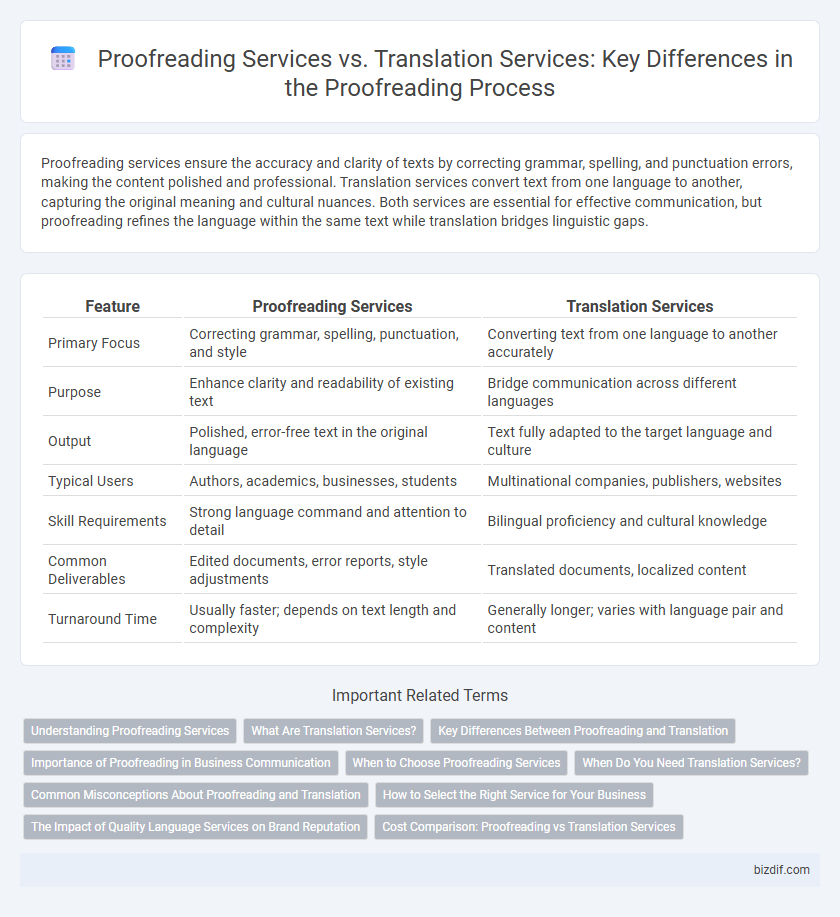Proofreading services ensure the accuracy and clarity of texts by correcting grammar, spelling, and punctuation errors, making the content polished and professional. Translation services convert text from one language to another, capturing the original meaning and cultural nuances. Both services are essential for effective communication, but proofreading refines the language within the same text while translation bridges linguistic gaps.
Table of Comparison
| Feature | Proofreading Services | Translation Services |
|---|---|---|
| Primary Focus | Correcting grammar, spelling, punctuation, and style | Converting text from one language to another accurately |
| Purpose | Enhance clarity and readability of existing text | Bridge communication across different languages |
| Output | Polished, error-free text in the original language | Text fully adapted to the target language and culture |
| Typical Users | Authors, academics, businesses, students | Multinational companies, publishers, websites |
| Skill Requirements | Strong language command and attention to detail | Bilingual proficiency and cultural knowledge |
| Common Deliverables | Edited documents, error reports, style adjustments | Translated documents, localized content |
| Turnaround Time | Usually faster; depends on text length and complexity | Generally longer; varies with language pair and content |
Understanding Proofreading Services
Proofreading services focus on identifying and correcting grammatical errors, punctuation mistakes, and inconsistencies to ensure clarity and accuracy in the original language. These services enhance the quality of a text without altering the intended meaning or style, maintaining the author's voice. Unlike translation services, proofreading does not involve converting content into another language but refines existing text for publication or professional use.
What Are Translation Services?
Translation services involve converting written text from one language into another while preserving the original meaning and cultural nuances. These services require linguistic expertise and cultural understanding to ensure accurate communication across languages. Unlike proofreading services, which focus on correcting grammar and spelling within the same language, translation services facilitate cross-lingual content adaptation.
Key Differences Between Proofreading and Translation
Proofreading services primarily focus on detecting and correcting grammatical, spelling, punctuation, and formatting errors within a single language, ensuring text clarity and accuracy. Translation services involve converting text from one language to another while maintaining the original message, tone, and cultural context. Key differences include language scope--proofreading refines existing content in one language, while translation requires bilingual expertise and localization skills.
Importance of Proofreading in Business Communication
Proofreading services ensure error-free and polished business communications, enhancing clarity and professionalism that directly impacts brand reputation and client trust. Unlike translation services, which focus on converting text between languages, proofreading refines the original language to eliminate grammatical, spelling, and formatting mistakes. Accurate proofreading prevents miscommunication and supports effective decision-making in high-stakes business environments.
When to Choose Proofreading Services
Proofreading services are ideal when the primary goal is to ensure accuracy, grammar, punctuation, and style consistency in texts originally written in a target language. These services are suitable for authors, businesses, and academics needing error-free documents without altering the original meaning or language. Choosing proofreading over translation is essential when the content does not require language conversion but demands professional refinement and final quality assurance.
When Do You Need Translation Services?
Translation services are essential when content must be converted from one language to another to reach a global audience or comply with multilingual requirements. They ensure accurate linguistic and cultural adaptation, preserving the original message's intent and tone. Proofreading alone cannot bridge language barriers or provide localization, making translation services crucial for international communication.
Common Misconceptions About Proofreading and Translation
Proofreading services focus on correcting grammar, spelling, punctuation, and style errors within a given language, while translation services involve converting text from one language to another. A common misconception is that proofreading includes translation, but it strictly ensures linguistic accuracy and coherence in the original language. Many clients also confuse translation with localization, which adapts content culturally and contextually beyond literal language conversion.
How to Select the Right Service for Your Business
Choosing the right service for your business depends on whether you need to refine existing text or adapt content for a different language audience. Proofreading services specialize in correcting grammar, punctuation, and style to ensure clarity and professionalism in the original language. Translation services focus on accurately converting text between languages while preserving meaning and cultural nuance, making the decision crucial based on your content goals and target market.
The Impact of Quality Language Services on Brand Reputation
High-quality proofreading services ensure error-free and polished content, reinforcing brand credibility and trust among target audiences. In contrast, professional translation services provide accurate cultural and linguistic adaptation, vital for maintaining consistency and authenticity in global markets. Both services are crucial for preserving brand reputation by delivering clear, precise, and culturally relevant communication across diverse platforms.
Cost Comparison: Proofreading vs Translation Services
Proofreading services typically cost significantly less than translation services due to the nature of the work, which involves refining existing content rather than creating new text in another language. Translation services demand linguistic expertise and cultural adaptation, increasing their price range from $0.10 to $0.25 per word, compared to proofreading rates, which usually range from $0.02 to $0.05 per word. Businesses can save budget by choosing proofreading when accuracy and quality assurance are needed for content in the original language, while translation remains essential for multilingual communication requiring complete language conversion.
Proofreading Services vs Translation Services Infographic

 bizdif.com
bizdif.com